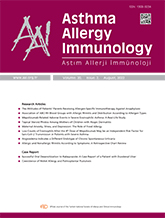


Objective: Patients with severe asthma require particular attention during the Severe Acute Respiratory Syndrome Coronavirus 2 (SARSCoV- 2) pandemic, not only due to the underlying airway disease but also in regard to the biological treatments received. Mepolizumab has a negative effect on the number and development of eosinophils, and the assertion that eosinopenia is a poor prognostic factor for Coronavirus disease 2019 (COVID-19) leads to confusion regarding the impact of mepolizumab on the course of COVID-19. Therefore, we aimed to demonstrate the potential risk factors for SARS-CoV-2 infection transmission in patients who were using mepolizumab for the treatment of severe asthma and had SARS-CoV-2 infection during their follow-up in this study.
Materials and Methods: The medical records of 27 adult patients who were being followed-up with a diagnosis of severe asthma and using mepolizumab [Female (F): 17, Male (M): 10] were reviewed to determine whether they had experienced SARS-CoV-2 infection within 1 year after March 2020 (between March 2020 and March 2021).
Results: After 1-year of follow-up, the rate of SARS-CoV-2 PCR positivity among patients receiving mepolizumab was 23.2% (six patients). As a result of univariate analysis, the eosinophil count after the 4th dose of mepolizumab treatment was found to be an independent predictor of SARS-CoV-2 PCR positivity (p:0.026, Odd ratio: 0.957, 95% of confidence interval: 0.920-0.995).
Conclusion: A reduced eosinophil percentage after mepolizumab treatment was found to be a risk factor for SARS-CoV-2 transmission. However, it is obvious that more extensive studies on the effect of low counts of eosinophils on SARS-CoV-2 transmission risk are needed, and clinicians caring for this patient group need to follow-up patients with low eosinophil counts closely for SARS-CoV-2 transmission.